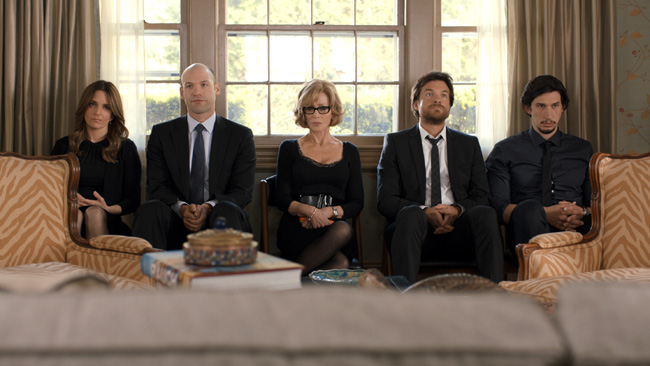CHICAGO – Patrick McDonald of HollywoodChicago.com appears on “The Morning Mess” with Dan Baker on WBGR-FM (Monroe, Wisconsin) on March 21st, 2024, reviewing the new streaming series “Manhunt” – based on the bestseller by James L. Swanson – currently streaming on Apple TV+.
Unoriginal, Unfunny ‘This is Where I Leave You’ a Poor Man’s ‘August: Osage County’
 Rating: 2.0/5.0 |
CHICAGO – Jason Bateman and an all-star cast got me there. The unfunny copycat story left me regretting it. If you don’t start with a solid plot that’s at least somewhat new, it doesn’t matter how many “A”-listers you throw into an ensemble. They’re just individuals doing the best they can with weak material. But the film’s fatal flaw is it can’t figure out who it is – a comedy, drama or dramedy? – and it didn’t do just one thing well.
On the surface, the new comedy from director Shawn Levy (“Real Steel,” “The Internship”) and rookie writer and novelist Jonathan Tropper might have seemed promising. Just put the combined talents of Jason Bateman, Tina Fey, Jane Fonda, Rose Byrne, Adam Driver, Timothy Olyphant, Kathryn Hahn, Dax Shepard, Abigail Spencer, Corey Stoll and Connie Britton in the same story and you’ve got a winner, right? Not if they’ve got nothing new to do together.

Photo credit: Warner Bros. Pictures
As it turns out, Tropper just has this group reading from the script of Tracy Letts’ award-winning “August: Osage County” play and screenplay. He neglects to add nearly enough new or different to warrant the carbon copy. The 2013 Tracy Letts film was memorably made by Meryl Streep’s leading role, but even without her gritty veracity, it’s still a league above and beyond Tropper’s recreation.
It’s impossible not to compare this new film to the previous. Likewise, it’s unrealistic not to be disappointed by Jane Fonda’s much less interesting role in place of Meryl Streep’s tour de force. Fonda’s artificially large breasts were perhaps funny the first time the joke was revealed, but the comedy sagged quite quickly after trying to use it a dozen times instead of simply writing a compelling character.
The film is redeemed only in its quick wins and sparsely successful decisions. Known from TV’s “Girls,” Adam Driver is a prime example. While comedy legends Jason Bateman and Tina Fey fall flat and instead coast through the film without ever standing out, Driver actually makes me laugh. He’s the quirky screw-up trying to date a sophisticated cougar when you know that’ll never work out.

Photo credit: Warner Bros. Pictures
He too is forced in the film’s central location – a simple house – where a family is unnaturally brought together by their father’s death and mother’s lie. The difference is he’s unpredictable, doesn’t always play it safe and takes his own creative liberties from a lackluster script. Driver even finds time for moments of emotional seriousness wrapped within his otherwise dopey character.
Even Ben Schwartz (TV’s “Parks and Recreation,” “House of Lies”) is a supporting character who’s bigger than the film’s well-known names. Another sparse uniqueness as compared to “August: Osage County,” Schwartz’s role is as a non-traditional rabbi whose childhood friends don’t take seriously at all. But even so, he too was plagued with about a dozen “boner” jokes too many.
Likewise, Rose Byrne – who doesn’t play an interesting character at all and we’ve seen this role a thousand times before – is nonetheless delightful as the girl next door. Sure, she’s conveniently never busy and now only has eyes for Jason Bateman since the word’s out about his deadbeat wife, but her allure is a welcome distraction from an otherwise boring story.

Photo credit: Jessica Miglio, Warner Bros. Pictures
If you decide to waste your money on this film, pay attention to a surprising Timothy Olyphant. Though he doesn’t have much to say and isn’t on screen often, he’s actually a novel character for this story that Tracy Letts didn’t have. After suffering a brain injury, Olyphant is joining the Jewish family in their decision to sit shiva (a Jewish mourning tradition). But he’s half there and half not.
It’s not because of ADD, but rather because he’s struggling to live as the man he is now while remembering the person he was when he could fully control himself. One of the most memorable scenes in this film is when Olyphant’s character needs a wrench from the garage, and then when he gets it, he can’t for the life of him figure out what he was going to do next.
I didn’t care if the guy got the girl, if the family found solace in temporarily being forced back together or the twist about who someone ends up with in the final act. Instead, it was moments like Olyphant’s realization of his powerless condition that got me to emote for him unlike most of the rest of the film and its characters.

Photo credit: Nicole Rivelli, Warner Bros. Pictures
In the end, “This is Where I Leave You” is a failed comedy, a forgettable drama and a poor man’s “August: Osage County” copycat.
 | By ADAM FENDELMAN |



TIWILY review
Other than the comments about Timothy Olyphant’s wonderful performance, I could not disagree more with this review. I saw August Osage County and while I appreciated a few moments of Meryl Streep’s performance, like recalling the present from her mother at Christmas, and I thought Margo Martindale and Chris Copper each had some fine moments in small roles, I could not wait for it to end so I could get out. It was so dark and depressing and sad. Because there is already a film about the passing of the father, should there not be others?
TIWILY was a film that I was drawn into from the start. I thought Tina Fey’s performance as the bossy older sister to 3 brothers, was wonderful. I didn’t know she had it in her. Her story with “Horry”, Tim Olyphant’s character could have been fleshed out more, but I loved it. The story of a family’s reaction to the death of the father can’t be new to any of us, but we can all relate to the situation in some small way. Each character held an interest for me…I read the book and was pleased that it translated so well to the screen. I missed the narration by the main character Judd, but no matter. I hope the public will see this film and judge for themselves instead of relying on reviews such as this one. Go see it, let yourselves get taken in and make up your own mind.